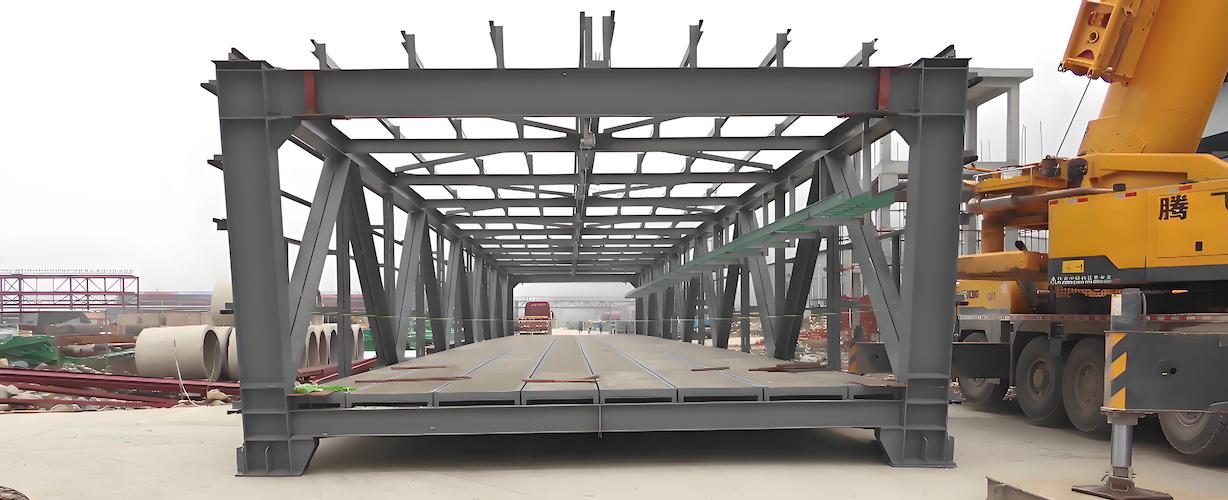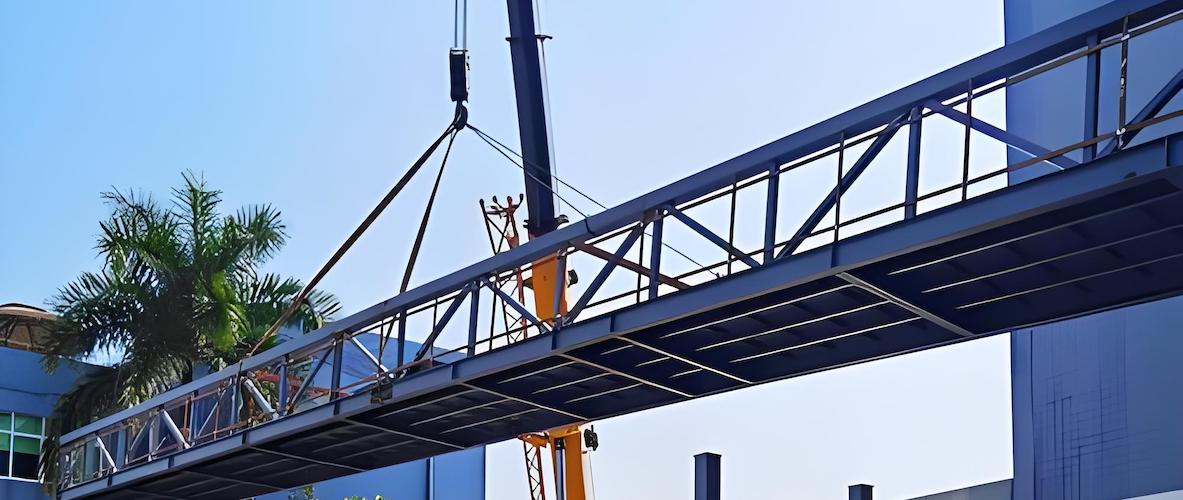Views: 211 Author: Site Editor Publish Time: 2025-10-27 Origin: Site









Content Menu
● Understanding Modular Pedestrian Bridges
>> What are Modular Pedestrian Bridges?
>> Advantages of Modular Pedestrian Bridges
● Leading Modular Pedestrian Bridge Manufacturers in Russia
>>> Innovative Design and Engineering
>>> Sustainability Initiatives
>>> Advanced Manufacturing Techniques
>>> Comprehensive Project Management
>>> Focus on Safety and Compliance
>> 4. Bridge Construction Company (BCC)
>>> Commitment to Sustainability
>>> Strong Industry Partnerships
● The Future of Modular Pedestrian Bridges in Russia
>> Government Initiatives and Support
● Frequently Asked and Questions regarding Modular Pedestrian Bridge Manufacturers
>> 1. What are the typical costs associated with installing a modular pedestrian bridge in Russia?
>> 4. What materials are commonly used in the construction of modular pedestrian bridges?
>> 5. How long does it typically take to install a modular pedestrian bridge?
Modular pedestrian bridges have become increasingly popular in urban planning and infrastructure development due to their versatility, cost-effectiveness, and ease of installation. In Russia, several manufacturers have emerged as leaders in this niche market, providing innovative solutions for pedestrian connectivity. This article explores the top modular pedestrian bridge manufacturers in Russia, highlighting their unique offerings, technological advancements, and contributions to the industry.
Modular pedestrian bridges are pre-fabricated structures designed to facilitate pedestrian movement across obstacles such as roads, rivers, and railway tracks. These bridges are constructed using modular components that can be easily assembled on-site, significantly reducing construction time and costs. The modular design allows for flexibility in size, shape, and materials, making them suitable for various environments and applications. This adaptability is particularly beneficial in urban settings where space is at a premium, allowing for the integration of pedestrian pathways into existing infrastructure without extensive disruption.
The advantages of modular pedestrian bridges are numerous. They are not only quick to install but also require minimal maintenance, which is a significant consideration for municipalities looking to manage budgets effectively. Their lightweight design allows for easier transportation and installation, making them ideal for urban areas where space is limited. Additionally, modular bridges can be customized to meet specific aesthetic and functional requirements, enhancing the overall urban landscape. The ability to incorporate features such as lighting, safety barriers, and even green spaces into the design further increases their appeal, making them not just functional structures but also attractive additions to public spaces.
With over 30 years of experience, Evercross Bridge, a top-three steel bridge manufacturer in China, has grown into one of Russia's leading modular pedestrian bridge manufacturers. The company specializes in a wide range of steel bridges, including pedestrian, vehicular, and railway bridges. Their commitment to quality and innovation, coupled with a long list of successful projects, has earned them a reputation as a trusted partner for infrastructure projects nationwide. This extensive experience enables them to navigate the complexities of large-scale projects, ensuring they meet both client expectations and regulatory requirements.
EVERCROSS BRIDGE employs advanced engineering techniques and cutting-edge technology in the design and manufacturing of their modular pedestrian bridges. Their team of skilled engineers works closely with clients to develop customized solutions that meet specific project requirements. The use of high-strength steel and corrosion-resistant materials ensures the durability and longevity of their bridges. Furthermore, their design process often incorporates feedback from urban planners and community stakeholders, ensuring that the final product not only meets technical specifications but also aligns with the needs and desires of the community.
In addition to their focus on quality, EVERCROSS BRIDGE is committed to sustainability. The company implements eco-friendly practices in their manufacturing processes, minimizing waste and reducing their carbon footprint. Their modular bridges are designed to be energy-efficient, contributing to greener urban environments. This commitment to sustainability is reflected in their choice of materials, which often include recycled content, and in their efforts to design bridges that can be easily disassembled and relocated, further extending their lifecycle and reducing environmental impact.
Mostotrest is another prominent player in the Russian modular pedestrian bridge market. Established in the early 2000s, the company has quickly gained recognition for its innovative approach to bridge construction. Mostotrest specializes in both modular and traditional bridge designs, offering a comprehensive range of solutions for various infrastructure needs. Their ability to adapt to changing market demands and technological advancements has positioned them as a leader in the industry.
Mostotrest utilizes state-of-the-art manufacturing techniques to produce high-quality modular pedestrian bridges. Their facilities are equipped with the latest technology, allowing for precise fabrication and assembly of bridge components. This attention to detail ensures that each bridge meets the highest standards of safety and performance. The integration of automated processes in their manufacturing line not only enhances efficiency but also reduces the likelihood of human error, resulting in consistently high-quality products.
The company offers a diverse range of modular pedestrian bridges, catering to different applications and environments. From simple footbridges to complex structures with integrated lighting and safety features, Mostotrest provides tailored solutions that enhance pedestrian accessibility and safety. Their portfolio includes bridges designed for urban parks, commercial areas, and even rural settings, demonstrating their versatility and commitment to meeting the unique needs of various communities.
Stroytransgaz is a well-established construction company in Russia, known for its expertise in large-scale infrastructure projects. The company has expanded its portfolio to include modular pedestrian bridges, leveraging its extensive experience in construction and engineering. This diversification allows Stroytransgaz to offer comprehensive solutions that encompass all aspects of bridge design and construction.
Stroytransgaz excels in project management, ensuring that each modular bridge project is completed on time and within budget. Their team of professionals oversees every aspect of the project, from design and engineering to construction and installation. This comprehensive approach guarantees a seamless experience for clients. By employing project management best practices, they can effectively coordinate with various stakeholders, including government agencies, contractors, and community groups, to ensure that all project goals are met.
Safety is a top priority for Stroytransgaz. The company adheres to strict safety standards and regulations, ensuring that all modular pedestrian bridges are designed and constructed with the highest level of safety in mind. Their commitment to compliance and quality assurance has earned them a strong reputation in the industry. Regular training sessions for their workforce on safety protocols and the use of advanced safety equipment further enhance their ability to deliver safe and reliable structures.
Bridge Construction Company, commonly known as BCC, is a leading manufacturer of modular pedestrian bridges in Russia. The company has a strong focus on innovation and sustainability, making it a preferred choice for many urban development projects. Their commitment to pushing the boundaries of design and engineering has allowed them to create bridges that are not only functional but also visually appealing.
BCC employs cutting-edge technology in the design and manufacturing of their modular bridges. Their use of computer-aided design (CAD) and building information modeling (BIM) allows for precise planning and execution of bridge projects. This technological advantage enables BCC to deliver high-quality structures that meet the evolving needs of urban environments. By utilizing these advanced tools, they can simulate various design scenarios, optimizing the bridge's performance and aesthetics before construction begins.
Sustainability is at the core of BCC's operations. The company prioritizes eco-friendly materials and practices in their manufacturing processes, contributing to the development of sustainable infrastructure. Their modular pedestrian bridges are designed to minimize environmental impact while providing safe and efficient pedestrian access. BCC also engages in community outreach programs to educate the public about the benefits of sustainable infrastructure, fostering a greater appreciation for eco-friendly practices in urban development.
Transstroy is a prominent construction company in Russia that has made significant strides in the modular pedestrian bridge sector. With a focus on innovation and quality, Transstroy has developed a range of modular bridge solutions that cater to various urban and rural applications. Their ability to adapt to different project requirements has made them a valuable partner for municipalities and private developers alike.
Transstroy offers a wide variety of design options for modular pedestrian bridges, allowing clients to choose structures that best fit their specific needs. Their bridges can be customized in terms of size, shape, and materials, ensuring that they blend seamlessly into their surroundings. This flexibility is particularly important in urban areas where aesthetic considerations are as crucial as functionality. Transstroy's design team collaborates with architects and urban planners to create bridges that enhance the visual appeal of public spaces.
Transstroy has established strong partnerships with local governments and organizations, enabling them to participate in numerous infrastructure projects across Russia. Their collaborative approach ensures that each project is tailored to the unique requirements of the community it serves. By working closely with stakeholders, Transstroy can address specific concerns and preferences, resulting in bridges that are not only functional but also embraced by the communities they serve.
The modular pedestrian bridge market in Russia is poised for growth, driven by increasing urbanization and the need for efficient transportation solutions. Manufacturers are continuously exploring new materials and technologies to enhance the performance and sustainability of their bridges. Innovations such as smart bridge technology, which incorporates sensors and monitoring systems, are becoming more prevalent, allowing for real-time data collection and maintenance. This trend towards smart infrastructure is expected to revolutionize how cities manage pedestrian traffic and bridge maintenance, leading to safer and more efficient urban environments.
The Russian government has recognized the importance of infrastructure development and is actively supporting projects that enhance pedestrian connectivity. Initiatives aimed at improving urban infrastructure are likely to boost the demand for modular pedestrian bridges, providing manufacturers with new opportunities for growth. Government funding and incentives for sustainable infrastructure projects further encourage the adoption of modular solutions, positioning manufacturers to play a crucial role in the future of urban development.
Modular pedestrian bridges play a crucial role in enhancing urban mobility and connectivity in Russia. Leading manufacturers such as EVERCROSS BRIDGE, Mostotrest, Stroytransgaz, BCC, and Transstroy are at the forefront of this industry, offering innovative solutions that meet the diverse needs of communities. As the demand for sustainable and efficient infrastructure continues to rise, these manufacturers are well-positioned to lead the way in the development of modular pedestrian bridges, contributing to the future of urban planning in Russia. Their commitment to quality, innovation, and sustainability will undoubtedly shape the landscape of pedestrian infrastructure for years to come.

The costs of installing a modular pedestrian bridge in Russia can vary significantly based on factors such as size, materials, and location. On average, the cost can range from 1 million to 5 million rubles (approximately 13,000 to 65,000 USD). Additional expenses may include site preparation, foundation work, and installation, which can further influence the total project cost.
Russian regulations and building codes play a crucial role in the design and construction of modular pedestrian bridges. These codes ensure that bridges meet safety, durability, and environmental standards. Manufacturers must comply with specific guidelines regarding materials, load capacity, and structural integrity, which can affect the design process and overall project timelines.
Several successful case studies highlight the effectiveness of modular pedestrian bridges in Russian cities. For instance, the installation of a modular bridge in Moscow's Gorky Park improved pedestrian access and connectivity. Similarly, a modular bridge in Kazan facilitated safe crossing over a busy roadway, enhancing urban mobility and safety for residents.
Common materials used in the construction of modular pedestrian bridges include steel, aluminum, and reinforced concrete. Steel is favored for its strength and durability, while aluminum is lightweight and resistant to corrosion. Reinforced concrete is often used for foundations and support structures, providing stability and longevity.
The installation time for a modular pedestrian bridge can vary depending on the complexity of the project and site conditions. However, one of the key advantages of modular bridges is their quick assembly. Typically, installation can be completed within a few days to a couple of weeks, significantly faster than traditional bridge construction methods.
